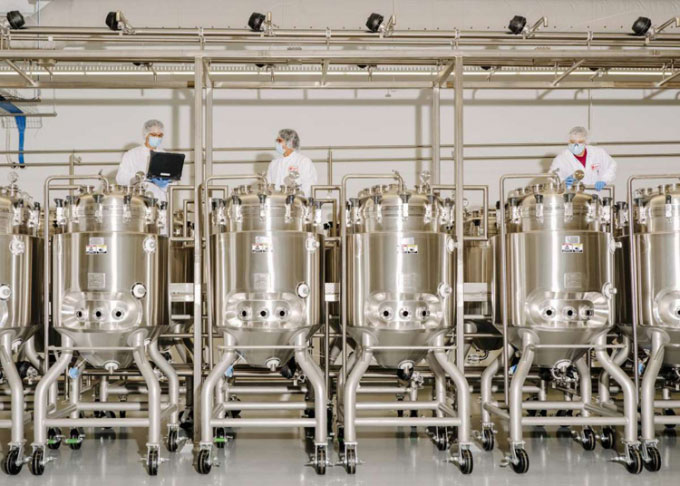The factory produces 22,600 kg of artificial meat per year
The Upside Foods factory is equipped with bioreactors to make meat from animal cells without slaughter.

Tanks in the meat culture room at the Upside Foods plant in Emeryville. Photo: Cayce Clifford
A new meat factory opened in Emeryville, California, on November 4. However, instead of slaughtering animals, the plant uses bioreactors to create meat. The plant currently produces more than 22,600 kg of meat per year and could increase that to 181,400 kg in the future.
The plant is part of a new $50 million facility owned by food technology company Upside Foods. The company said that the factory is ready to operate on a commercial scale. Many other companies also produce artificial meat, also known as cultured or lab-grown meat, but usually on a smaller scale.
The US government has not yet approved the sale of cultured meat. However, according to Amy Chen, chief executive officer of Upside Foods, the new plant is proof that the technology is ready. "This is not a dream, nor is it science fiction. This is reality today," Chen said.
Upside Foods will organize tours and product trials. Once it is approved to sell meat, the company plans to start supplying restaurants, including chef Dominique Crenn's 3-Michelin-starred Atelier Crenn restaurant in San Francisco. After being introduced to the public through chefs, the artificial meat will appear at the grocery store.
Unlike plant-based meat, cultured meat actually comes from animals. The Upside Foods factory has large tanks called bioreactors that look like a brewery. Cells taken from live animals will be soaked in nutrients such as glucose, vitamins and amino acids in the tank.
The bioreactor creates an environment similar to that of an animal's body, where nutrients feed the cells until they get larger, forming a product that doesn't have the same structure as ground meat. Some of the more complex extra steps help create a framework for the cells to grow together, forming the fibers and textures that resemble a cut of meat, such as a steak or chicken breast.
Proponents argue that this process not only avoids the killing of animals, but also saves land and water, is an efficient and environmentally friendly method of meat production. That's in part because the process of producing cultured meat is much faster, shortening from three years - the time it takes to raise an adult cow - to a few weeks.
Upside Foods has now attracted more than $200 million in funding. Not only did the company pioneer an artificial meat factory, the company also made some remarkable progress. Upside Foods can produce cuts of meat while many other brands can only produce ground meat. Upside Foods' first product is expected to be chicken breast. In the future, if suitable cells are received for culture, Upside Foods' plant could produce anything from duck to lobster.
- Artificial meat $ 330,000 to the oven
- There is an opportunity to 'enjoy' artificial meat
- Artificial meat 'crowned' next 2 years?
- Coming soon the world's first cheap artificial beef cake
- The world's most expensive artificial meat tastes great
- Artificial beef will be available in the market: Breakthroughs for vegetarians because they do not want to kill
- For the first time there was a banquet with artificial meat
- Dishes from the lab
- The world's first artificial fried meatballs
- Launched the first manual manual for artificial food processing
- Startup Israel declared to make artificial steak, costing 50 USD / piece, tastes like real cow
- In Russia, there will soon be selling artificial meat
 'Fine laughs' - Scary and painful torture in ancient times
'Fine laughs' - Scary and painful torture in ancient times The sequence of numbers 142857 of the Egyptian pyramids is known as the strangest number in the world - Why?
The sequence of numbers 142857 of the Egyptian pyramids is known as the strangest number in the world - Why? History of the iron
History of the iron What is alum?
What is alum? This extremely famous type of meat is good for both men and women. During Tet, you should use it to nourish your body.
This extremely famous type of meat is good for both men and women. During Tet, you should use it to nourish your body.  Eel meat is very nutritious, but who should not eat eel meat?
Eel meat is very nutritious, but who should not eat eel meat?  Strange animal 'tastes better than dragon meat', costs only 500,000 VND/kg but farmers don't want to raise it
Strange animal 'tastes better than dragon meat', costs only 500,000 VND/kg but farmers don't want to raise it  Is it harmful to eat 'buried pork' buried underground for 2-3 years?
Is it harmful to eat 'buried pork' buried underground for 2-3 years?  Find out the cause of colorectal cancer increase in young people
Find out the cause of colorectal cancer increase in young people  How to choose delicious kitchen buffalo meat is extremely simple
How to choose delicious kitchen buffalo meat is extremely simple 